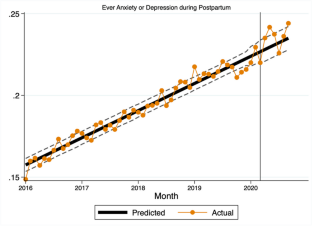2024-09-11 ジョージア大学 (UGA)
<関連情報>
- https://news.uga.edu/postpartum-women-filled-more-benzo-prescriptions-during-pandemic/
- https://link.springer.com/article/10.1007/s00737-024-01488-4
COVID-19における産後不安に対するベンゾジアゼピン処方の増加 Increases in benzodiazepine prescribing for postpartum anxiety during COVID-19
Grace Bagwell Adams,Shelby Steuart,Emily C. Lawler,Hailemichael Shone & Amanda J. Abraham
Archives of Women’s Mental Health Published:28 June 2024
DOI:https://doi.org/10.1007/s00737-024-01488-4

Abstract
Purpose
Postpartum mood disorders affect many women following childbirth. Prescribing medication for depression and anxiety is one strategy for the effective treatment of postpartum mood disorders. Left untreated, mothers experiencing these disorders and their infants face increased risks of adverse health outcomes. Little is known about how diagnosis and treatment of postpartum mood disorders changed during COVID-19.
Methods
We used a retrospective pooled cross-sectional design in a sample of privately-insured postpartum women in U.S. claims data from January 1, 2016 to December 31, 2020. We measured changes in diagnoses of anxiety and depression and changes in prescription fills and days supplied of classes of medications used to treat these conditions (antidepressants, benzodiazepines, and z-drugs). We used ordinary least squares (OLS) regression for each outcome variable during the pre-pandemic period and forecast expected outcomes the observation period. Forecasted and actual values of the outcomes were then compared.
Results
Following the onset of the COVID-19 pandemic in March 2020, diagnoses of depression and anxiety were not significantly higher among privately insured postpartum women in the United States. The proportion of privately-insured postpartum women filling a benzodiazepine prescription increased by 15.2%.
Conclusions
We find diagnosis of postpartum mood disorders did not increase after the onset of the COVID-19 pandemic, however, fills of benzodiazepines increased among privately-insured postpartum women. Given prior evidence of increased depressive and anxiety symptoms among postpartum women during COVID-19, this suggests increased barriers to appropriate diagnoses and treatment for depression during this period.

